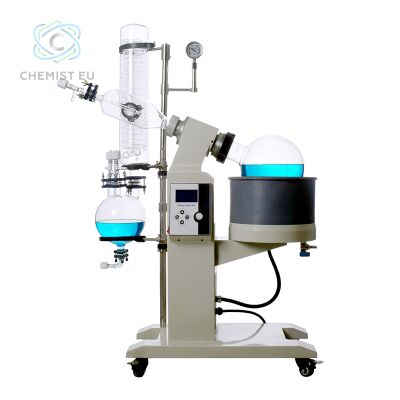Qu'est-ce qu'un évaporateur rotatif ?
Published on November 23, 2023
Qu'est-ce qu'un évaporateur rotatif ?
Le dispositif de laboratoire de l'évaporateur rotatif sous vide est un outil instrumental populaire utilisé pour l'évaporation efficace du liquide ou de ses fractions dans des conditions de pression réduite. Parmi les avantages qu'il possède, les suivants peuvent être soulignés :
- le chauffage uniforme de la matière à distiller
- stimuler le processus actif de vaporisation des substances liquides ;
- sécurité garantie lors du travail avec des composants inflammables, intensément odorants et toxiques ;
- Adaptation au traitement en douceur des matières sensibles à la température et sujettes aux mousses ;
- une productivité et une efficacité élevées ;
- optimisation du temps des processus ;
- minimisation des coûts grâce à la possibilité de régénération du solvant.
Le mécanisme de fonctionnement de l'évaporateur rotatif, basé sur l'utilisation de la distillation sous vide, comprend les composants clés suivants :
- ballon d'évaporation ;
- moteur électrique ;
- chambre de chauffe ;
- un refroidisseur de retour doté d'une soupape de décharge ;
- un réservoir pour la collecte des matières vaporisées.
Le système de réfrigération du condenseur et la pompe à vide ou à eau sont connectés séparément.
Le premier exemple d'évaporateur rotatif de laboratoire a été introduit au milieu du XXe siècle par un biochimiste américain, Lehman Craig. Au début, les chimistes étaient un peu sceptiques, car la distillation était réalisée avec succès sur l'équipement le plus élémentaire. Cependant, les chercheurs ont rapidement apprécié les avantages en termes de gain de temps et de main-d'œuvre. L'appareil permettait une évaporation plus efficace, surtout dans le cas de grands volumes de solvants, et ne nécessitait qu'un minimum de travail manuel.
L'appareil a subi plusieurs modifications, y compris l'introduction d'une série d'améliorations supplémentaires pour en faciliter l'utilisation. En conséquence, il est devenu très recherché et on le trouve aujourd'hui dans presque tous les laboratoires de recherche.
Les versions modernes de l'appareil sont souvent équipées de fonctions supplémentaires qui contribuent à accroître la productivité et à simplifier le flux de travail. Il peut s'agir d'une unité de commande électronique et d'un écran pour un contrôle précis de la rotation et du chauffage des flacons.
Comment fonctionne un évaporateur rotatif ?
Le principe fondamental du fonctionnement de l'évaporateur rotatif est l'utilisation d'une caractéristique physique des liquides, à savoir la dépendance du point d'ébullition par rapport à la pression externe. Cela signifie qu'en réduisant la pression dans la cuve de réaction, nous pouvons effectivement réduire la température nécessaire pour faire bouillir le mélange de travail. Par exemple, l'éthanol normal à la pression atmosphérique commence à bouillir à +78,4 °C, alors qu'à une pression de 40 mmHg, ce processus commence déjà à +19 °C.
Le processus d'évaporation dans un évaporateur rotatif se déroule dans un ballon spécial, qui est soumis à un mouvement de rotation par un moteur électrique. Sous l'influence de la rotation, la surface du ballon est uniformément recouverte d'une couche de liquide, créant ainsi un film mince. C'est à partir de ce film que se produit le processus de vaporisation. En raison de la grande surface du film, le taux de vaporisation du liquide est beaucoup plus élevé que celui des appareils de distillation standard.
Il convient de noter que les évaporateurs rotatifs présentent un certain nombre d'avantages intéressants :
- Évaporation efficace.
- Possibilité de contrôler les paramètres.
- Economies d'énergie.
- Augmentation de la productivité.
En résumé, les évaporateurs rotatifs sous vide sont des appareils efficaces et pratiques qui permettent la distillation et la concentration de substances à un coût minimal et avec une contrôlabilité maximale du processus.
Que fait un évaporateur rotatif ?
Les évaporateurs rotatifs sont demandés dans des processus tels que
- la synthèse chimique ;
- l'extraction de solvants à froid ;
- la distillation ;
- la distillation de solvants ;
- la distillation ;
- concentration des liquides ;
- séchage de poudres ;
- purification de substances ;
- recristallisation ;
- réaction dans la zone de déflegmation ;
- séparation du mélange en fractions.
Ces équipements sont utilisés dans les industries chimiques, cosmétiques, de la parfumerie, pétrochimiques, alimentaires et pharmaceutiques. Cet équipement est apprécié pour sa simplicité de conception, sa multifonctionnalité, ses faibles pertes et bien d'autres qualités. Si vous êtes intéressé par l'achat d'un tel équipement pour le laboratoire, explorez l'assortiment proposé dans la boutique en ligne chemist.eu.


